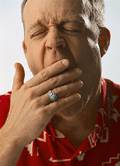 |
 |
 |

Sleep Therapy Restores Brain Function in Insomniacs
Brain imaging suggests it could be a non-pharmacological intervention for the disorder|
|
HealthDay
By Kevin McKeever
Thursday, September 4, 2008
 THURSDAY, Sept. 4 (HealthDay News) -- Insomnia compromises brain functions that affect verbal fluency but may not hurt one's speaking ability, a new study says.
THURSDAY, Sept. 4 (HealthDay News) -- Insomnia compromises brain functions that affect verbal fluency but may not hurt one's speaking ability, a new study says.
Functional magnetic resonance imaging (fMRI) scanning found that the left medial prefrontal cortex and the left interior frontal gyrus -- two brain regions that deal with fluency -- are less active during verbal fluency tasks being performed by insomniacs, compared with other people.
However, the study results, published in the Sept. 1 issue of the journal Sleep, showed that those with insomnia generated more words than non-insomniacs on both the category fluency task (46.4 words compared with 38.7 words) and the letter fluency task (40.1 words compared with 32.7 words).
"It was surprising to see that the patients performed at a higher level than the control group, but showed reduced brain activation in their fMRI results," principal investigator Ysbrand Der Werf, of the Netherlands Institute for Neuroscience in Amsterdam, said in a news release issued by the magazine's publisher. "The success during the task may reflect a conscious effort to counteract the effect of poor sleep."
The researchers found that six weeks of sleep therapy restored the brain function and also helped patients generate more words on the verbal fluency tasks, although they said the additional number of words was not statistical significant.
Sleep therapy treatment combined restriction of sleep with multifaceted cognitive-behavior therapy, exposure to bright light in the morning and late afternoon, and body temperature manipulations.
According to the study authors, these results should encourage the use of sleep therapy in clinical practice as a low-cost, non-pharmacological treatment for insomnia.
The study included 21 chronic insomnia patients and 12 healthy controls with an average age of around 60. People with insomnia for at least 2.5 years were considered "chronic."
HealthDay
Copyright (c) 2008 ScoutNews, LLC. All rights reserved.
Related News:
More News on this Date
Related MedlinePlus Pages:
| Home | Health Topics | Drugs & Supplements | Encyclopedia | Dictionary | News | Directories | Other Resources | |
| Disclaimers | Copyright | Privacy | Accessibility | Quality Guidelines U.S. National Library of Medicine, 8600 Rockville Pike, Bethesda, MD 20894 National Institutes of Health | Department of Health & Human Services |
Date last updated: 05 September 2008 |




